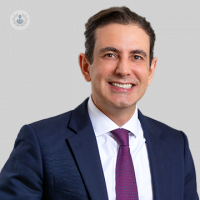Can rosacea ever go away on its own?
Autore:Certain factors should be avoided if a patient has rosacea. The redness and blushing caused by this condition can be uncomfortable, but there are some ways of managing it.

We spoke to Dr Ariel Haus, a leading dermatologist based in London, to discuss causes, triggers, treatment and what may happen if rosacea isn't treated.
What are the main causes of rosacea?
The cause of rosacea is still unknown. Dermatologists can provide improvement, but there is no cure and so we need to manage the individual triggers that will cause an individual’s rosacea to flare up. Sunlight, stress, exercise, heat, sudden changes in temperature, alcohol, certain skincare ingredients, spicy foods and caffeine are all well-known triggers.
What type of treatments are available?
Topical and oral medication, as well as heat-producing devices such as non-ablative lasers. The exact type and severity of rosacea that a patient has will determine what topical or oral medication is prescribed. The number of sessions of laser required will vary from person to person, but typically a course of at least six treatments would be necessary for good improvement, spaced three weeks apart.
Does Rosacea ever go away?
No, it is a chronic condition that can be managed but not completely cured.
Has anyone ever cured their rosacea?
No, the best we can hope for is to keep the rosacea under control to avoid long term damage to the skin and other tissue.
Are there any diet or lifestyle changes that can help?
Yes, avoid caffeine, spicy foods, foods with lots of added preservatives, excess alcohol consumption, smoking and sun exposure. Managing stress will also help.
What happens if rosacea is left untreated?
Left untreated, rosacea will gradually become worse and more difficult to treat. Early intervention is essential if rosacea is to be successfully managed. There is also the possibility of the rosacea compromising not only the skin but affecting the eyes as well. The broken blood vessels beneath the surface of the skin, which are a classic symptom of rosacea, can become permanent and impossible to remove. Patients with rosacea on the nose can also develop an oversized or bulbous nose that cannot be reversed.
If you're looking to treat rosacea, we recommend booking an appointment with a leading dermatologist such as Dr Ariel Haus . Visit his Top Doctors profile today for information on appointment availability.


